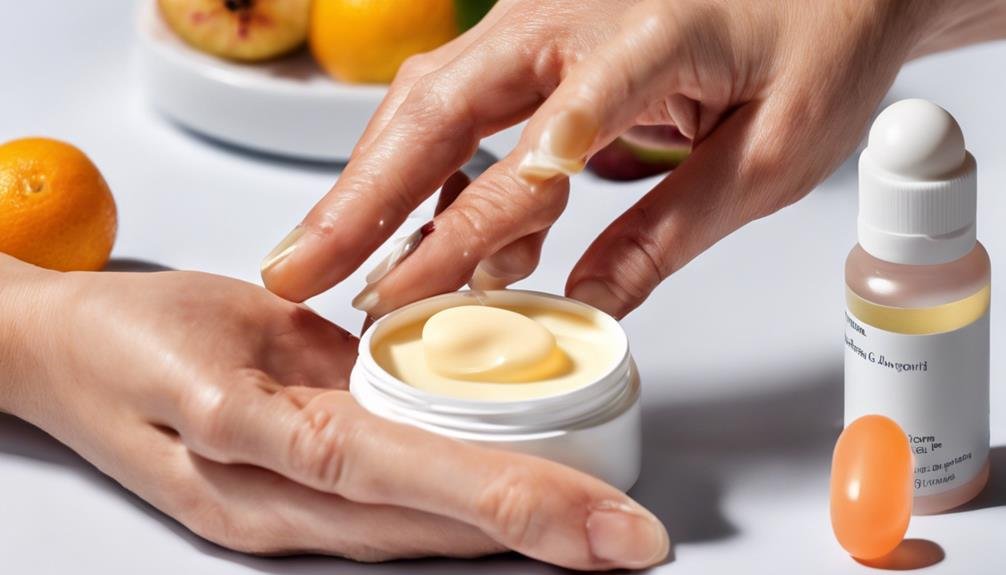When it comes to your skin, ensuring it receives the necessary daily vitamins is a key component of a healthy skincare routine. The benefits of vitamins like C, E, A, and D go beyond what meets the eye, working diligently to enhance your skin's resilience and vibrancy. Understanding the specific roles each vitamin plays in nurturing your skin can pave the way for a more radiant and youthful appearance. But how exactly do these daily vitamins work together to promote skin health and vitality?
Importance of Skin Vitamins
Skin vitamins play a crucial role in maintaining the health and appearance of your skin. Two key aspects influenced by skin vitamins are skin hydration and antioxidant protection.
Adequate intake of vitamins such as Vitamin E and Vitamin A can help improve skin hydration by promoting moisture retention in the skin layers. These vitamins work by strengthening the skin barrier, reducing water loss, and enhancing overall hydration levels.
In addition to skin hydration, skin vitamins like Vitamin C and Vitamin E provide essential antioxidant protection. Antioxidants help neutralize free radicals, which are unstable molecules that can damage skin cells and accelerate aging.
By incorporating antioxidant-rich vitamins into your skincare routine or diet, you can help protect your skin from oxidative stress, environmental pollutants, and UV radiation. This protection not only supports skin health but also contributes to a more youthful and radiant complexion.
Vitamin C Benefits for Skin
Within the realm of skincare, Vitamin C emerges as a potent ally in maintaining skin health and vitality. This essential nutrient offers a range of benefits that can enhance the appearance and resilience of your skin. Here are four key advantages of incorporating Vitamin C into your skincare routine:
- Collagen Production: Vitamin C plays a crucial role in collagen synthesis, a protein essential for maintaining skin elasticity and firmness. By promoting collagen production, Vitamin C helps reduce the appearance of fine lines and wrinkles, giving your skin a more youthful look.
- Brightening Effects: Vitamin C is known for its ability to brighten the skin and even out skin tone. It helps fade dark spots and hyperpigmentation, resulting in a more radiant complexion.
- Antioxidant Protection: As a powerful antioxidant, Vitamin C helps protect the skin from damage caused by free radicals and environmental stressors, reducing signs of premature aging.
- Wound Healing: Vitamin C aids in the skin's natural healing process, promoting faster recovery from wounds, scars, and skin damage.
Vitamin E for Skin Repair
Having explored the benefits of Vitamin C for skin health, let's now focus on the role of Vitamin E in skin repair. Vitamin E offers various benefits for skin repair and overall health. It is known for its antioxidant properties, which help protect skin cells from damage caused by free radicals. Additionally, Vitamin E promotes skin hydration, keeping the skin moisturized and supple.
| Vitamin E Benefits | Skin Repair, Antioxidant Properties |
|---|---|
| Protects skin cells | Promotes healing and repair |
| Enhances skin hydration | Fights off free radicals |
| Supports skin elasticity | Helps reduce signs of aging |
| Soothes irritated skin | Aids in scar reduction |
| Improves overall skin health | Maintains skin barrier function |
Including Vitamin E in your skincare routine can aid in skin repair, reduce signs of aging, and ensure your skin remains healthy and radiant. Consider incorporating Vitamin E-rich foods or supplements to support your skin's repair process and maintain its youthful appearance.
Vitamin A for Skin Renewal
With its crucial role in skin renewal, Vitamin A is a powerful nutrient that contributes significantly to the maintenance of healthy skin. This essential vitamin offers a multitude of benefits for your skin rejuvenation. Here are some key points to consider:
- Cell Turnover: Vitamin A aids in the process of skin cell turnover, promoting the shedding of old, damaged skin cells and encouraging the growth of new, healthy cells.
- Collagen Production: By stimulating collagen production, Vitamin A helps improve skin elasticity and firmness, reducing the appearance of fine lines and wrinkles.
- Acne Treatment: Vitamin A derivatives, such as retinoids, are commonly used in acne treatments due to their ability to unclog pores, reduce inflammation, and regulate oil production.
- Sun Damage Repair: Vitamin A can help repair skin damage caused by UV exposure, supporting the skin's natural repair mechanisms and reducing the risk of premature aging.
Incorporating Vitamin A into your daily skincare routine can help you achieve smoother, healthier skin and support overall skin vitality.
Vitamin D and Skin Health
To maintain optimal skin health, ensuring an adequate intake of Vitamin D is essential for its role in supporting various skin functions. Vitamin D plays a crucial role in skin health by promoting cell growth, repair, and metabolism. One of the primary sources of Vitamin D is sun exposure, where the skin synthesizes this vital nutrient upon exposure to sunlight. However, it's important to balance sun exposure to prevent skin damage.
Furthermore, Vitamin D is known to modulate the immune system, influencing skin immune responses and potentially reducing the risk of certain skin conditions. Research suggests that adequate levels of Vitamin D can help in managing inflammatory skin conditions like eczema and psoriasis. By supporting the immune system, Vitamin D contributes to overall skin health and resilience.
Incorporating Vitamin D into your daily routine, whether through sunlight exposure or dietary sources, can aid in maintaining healthy skin functions and supporting the immune system to protect against various skin issues.
Essential Skin Vitamins
Exploring the realm of essential skin vitamins reveals a spectrum of nutrients crucial for maintaining skin health and vitality. These vitamins play key roles in providing antioxidant protection and promoting collagen production, essential for youthful and radiant skin.
Here are four vital skin vitamins to include in your daily routine:
- Vitamin C: Known for its potent antioxidant properties, Vitamin C helps protect the skin from free radicals that can cause premature aging. It also plays a crucial role in collagen synthesis, aiding in maintaining skin elasticity and firmness.
- Vitamin E: Another powerful antioxidant, Vitamin E helps protect the skin from sun damage and environmental stressors. It promotes skin repair and rejuvenation, contributing to a glowing complexion.
- Vitamin A: Essential for collagen production and skin cell turnover, Vitamin A supports the skin's natural regeneration process. It helps reduce the appearance of fine lines and wrinkles, promoting a smoother texture.
- Vitamin B3 (Niacinamide): This vitamin helps strengthen the skin's barrier, improving moisture retention and reducing inflammation. It also aids in reducing hyperpigmentation and enhancing skin tone, leading to a more even complexion.
Incorporating these essential skin vitamins into your daily regimen can help you achieve healthier, more vibrant skin.
Frequently Asked Questions
Can I Take Multiple Skin Vitamins Together for Better Results?
Yes, you can combine multiple skin vitamins for enhanced efficacy. Ensure you follow optimal dosages to avoid adverse effects. Consult a healthcare provider for personalized advice. Vitamin combinations may complement each other for better skin health outcomes.
Are There Any Side Effects of Consuming Too Many Skin Vitamins?
When you consume too many skin vitamins, you may experience vitamin overdose leading to adverse effects. Additionally, watch out for potential interactions between different vitamins, as this can also affect your health negatively.
Can I Get Enough Skin Vitamins From My Diet Alone?
You may struggle to obtain all necessary skin vitamins solely from your diet. Supplement benefits can aid in filling potential gaps. Vitamin absorption varies. Consult a healthcare provider to determine your specific needs.
Are There Specific Skin Conditions That Vitamins Can Help Improve?
Wondering if vitamins can improve specific skin conditions? Indeed, they can. For acne prevention, focus on Vitamin A and Zinc. Vitamin C aids in wrinkle reduction. Eczema management benefits from Vitamin D. Vitamin E helps with hyperpigmentation treatment.
How Long Does It Take to See Noticeable Improvements in Skin Health With Vitamins?
You'll start noticing skin health improvements within 4-6 weeks of consistent vitamin dosage. Hydration levels boost faster with vitamins aiding in cell turnover. Be patient and maintain a routine to achieve optimal skin benefits.
Conclusion
In conclusion, incorporating daily vitamins into your skincare routine is like giving your skin a daily dose of nutrients to thrive. Just like how a plant needs sunlight and water to grow, your skin needs essential vitamins like Vitamin C, E, A, and D to flourish and maintain its health and vitality. By nourishing your skin with these powerhouse vitamins, you can achieve a radiant complexion and protect against environmental damage for a healthier, more youthful appearance.





